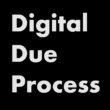Every few weeks, members of the clinic get together (virtually) to read and discuss books relevant to our research interests. Topics of discussion include the agency of data subjects, forms of resistance towards being targeted, tensions between privacy and control, and many more.
Next Meeting:
The Book Club will meet again in the Fall 2024.
How can I participate? Please reach out to the organizers to express your interest. As our meetings are virtual, you can participate from anywhere! In the past, our participants were based in Ithaca, NY; Evanston, IL; Dublin, OH; Taipei, Taiwan; Toronto, Canada; and Sydney, Australia.
Organizer of 2024–25 cycle: TBD (dueprocess@cornell.edu)
Past convenors: Stephen Yang (2020–2021), Carson Crane (2021–2022), Lorlei Boyd (2022–2023)
On Our Reading List








Academic Year 2023–2024
We’re on sabbatical for the 2023–2024 academic year. 😉
Summer 2023 ⛱️
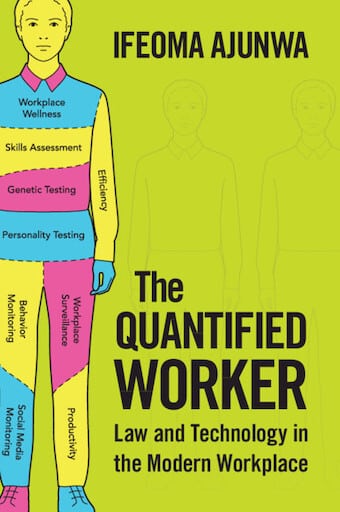
The Quanified Worker: Law and Technology in the Modern Workplace
by Ifeoma Anjunwa
July 9, 2023
Highlights of Discussions:
- What counts as “performance” in workplace settings?
- How to resist metrics from a position of powerlessness?
Academic Year 2022–2023

Human Compatible: Artificial Intelligence and the Problem of Control
by Stuart Russell
March 31, 2023
Highlights of Discussions:
- Who are the experts when we are thinking about the future of AI? Engineers? Developers? Or those who are displaced?
- Does Russell give a good representation of people and their preferences? And is this enough to develop “safe” AI?
- Do we really care that much about the potential threat of superintelligence? For whom is this a problem, and how so?
- How is education changing with the advent of “generative AI” tools?

Qualityland: A Novel
by Marc-Uwe Kling
February 12, 2023
Highlights of Discussions:
- How might algorithmically targeted discussion posts enable inflammatory comments?
- When does “late stage capitalism” become something else entirely?
- Where do we draw a distinction between dystopian and reality?
- How can works of fiction still educate readers on topical issues in information science?

Voices in the Code: A Story about People, Their Values, and the Algorithm They Made
by David G. Robinson
December 15, 2022
Highlights of Discussions:
- What happens when the moral intent of an algorithm is supported by math beyond layman’s understanding? Do you seek transparency?
- Do you have a civic duty to actively participate in the design of publicly working algorithms like those for organ transplants?
- Are fields becoming interdisciplinary with the inseparability of those fields and computer science?

How to Destroy Surveillance Capitalism
by Cory Doctorow
November 1, 2022
Highlights of Discussions:
- How can surveillance capitalism aid the dispersal of controversial ads?
- Who has the authority and expertise to regulate ads?
- Is paying for a service to have fewer ads a trade-off we have to make?
- How might social media enable engagement over enjoyment?
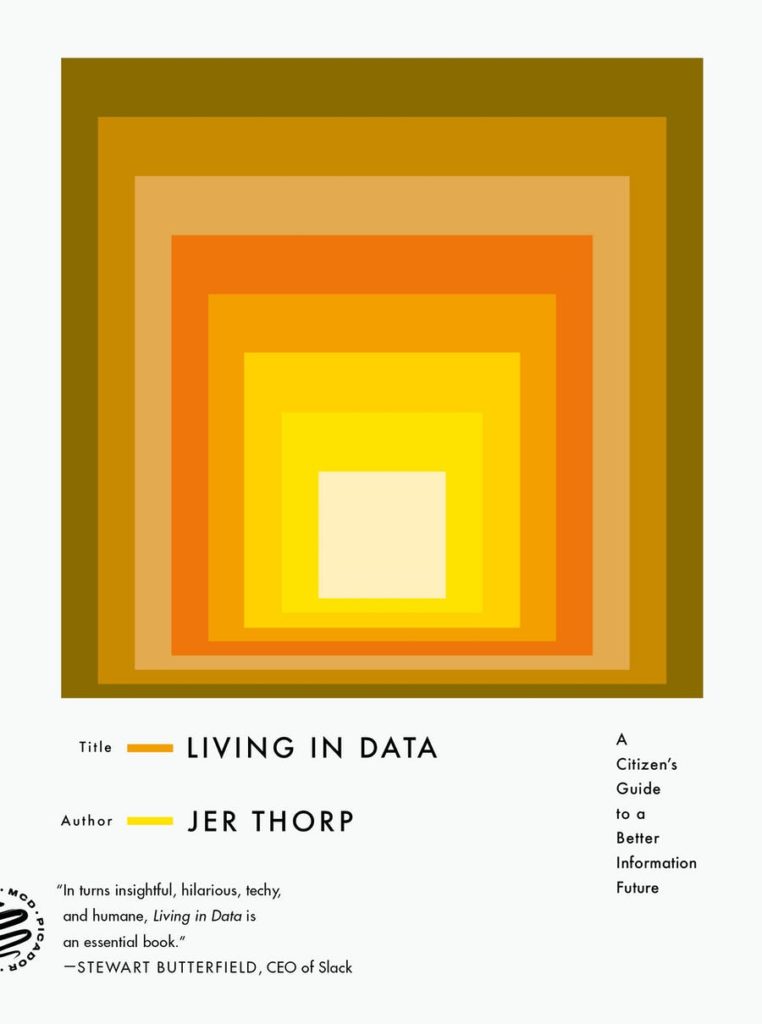
Living in Data: A Citizen’s Guide to a Better Information Future
by Jer Thorp
September 13, 2022
Highlights of Discussions:
- What does it mean for people to have data sovereignty?
- What can be gained and lost from data visualizations?
- What does it mean “to be data’ed” or “to data someone”?
- How does the accessibility of data affect its life?
Summer 2022 ⛱️

Invisible Women: Exposing Data Bias in a World Designed for Men
by Caroline Criado Perez
July 35, 2022
Highlights of Discussions:
- How does the author’s mobilization of women in care-taking roles impact the argument?
- How does framing development as either blameless and gradual or deliberate and disruptive affect the strength of the arguments?
- How does data impact our perception of issues and their systemic nature?
- How do transgender, non-binary, and other people fit into the picture?

Blockchain Chicken Farm: And Other Stories of Tech in China’s Countryside
by Xiaowei Wang
June 3, 2022
Highlights of Discussions:
- What values and ideas are communicated by the recipes that the author places between chapters?
- Do consumers really have choices when buying their products, if they want to control for supply chain origins?
- How much can we optimize a system? Is a system ever really closed?
Academic Year 2021–2022

Subprime Attention Crisis: Advertising and the Time Bomb at the Heart of the Internet
by Tim Hwang
April 27, 2022
Highlights of Discussions:
- How do we maintain the bubble? How do we reconcile this with generations that seem to completely ignore advertisements?
- How do we make the process of advertising more transparent without making it worse? Are there ways to make these incredibly fast transactions legible?
- How might techno-chauvinism factor into attempts to buoy advertising? Do we continue supporting advertising despite its faults because we believe there should be a technological solution?

Cloud Ethics: Algorithms and the Attributes of Ourselves and Others
by Louise Amoore
March 30, 2022
Highlights of Discussions:
- How do we view responsibility with respect to algorithms? Is the search for a single individual or group that is responsible useful?
- How can we incorporate doubt in our evaluation of algorithms and their outputs? What are the most productive ways to use these tools?
- What happens when we trust algorithmic outputs over human advice? How does doubt as it is used here connect to previous readings’ discussions of dismantling our reverence of technology?

Artificial Unintelligence: How Computers Misunderstand the World
by Meredith Broussard
February 23, 2022
Highlights of Discussions:
- How do Hackathons contribute to and potentially reinforce technology innovation narratives? What do we think of Hackathon expansion into other disciplines?
- How does Broussard balance a usefulness of technology in some contexts with its failures and breakdowns in others to create a frankness around the discussion of technology typically unseen?
- How do the coding sections influence the reader? Does it provide credibility to Broussard as a programmer? Does it draw in a more lay audience in ways which make technology appear more accessible?
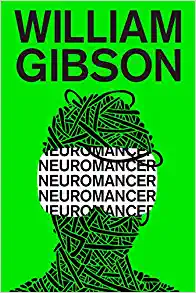
Neuromancer
by William Gibson
January 17, 2022
Highlights of Discussions:
- How does Gibson present artificial intelligence? What do we make of their personalities and desires?
- How do we navigate the different worlds within this story? Where do we feel disoriented?
- In what ways does the context of the reader influence this book? What events at the time of writing may have influenced different aspects of the book?
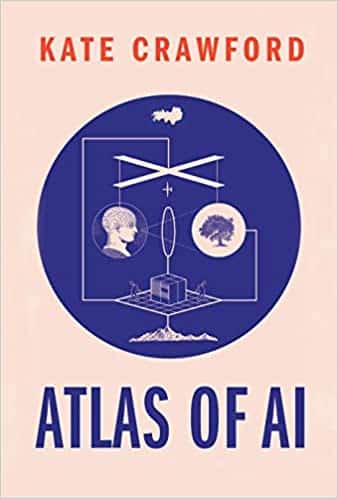
Atlas of AI: Power, Politics, and the Planetary Costs of Artificial Intelligence
December 8, 2021
Highlights of Discussions:
- How does the author manage their ties both to industry and ethics organizations to craft a telling of some pitfalls of technology?
- What worked particularly well for the chapter “Affect”? What did we like about this story-like telling?
- What do those working on and with AI need to know? Do current curricula serve these needs?

Metrics at Work: Journalism and the Contested Meaning of Algorithms
By Angele Christin
October 18, 2021
Highlights of Discussions:
- How does an algorithmic public differ from a public? How do journalists relate to approximations?
- How does a cross country study work? What do you gain from comparisons and what do you lose?
- What does the physical layout of office spaces add to the argument? How might it reinforce points already made?

Life in Code: A Personal History of Technology (2017)
By Ellen Ullman
September 23, 2021
Highlights of Discussions:
- How does our work with machines affect the machine versus human distinction? Does working with machines allow us to better understand humans?
- How do we make sense of seemingly different and distinct behavior in technological working groups? Do people follow different norms in these settings?
- How does the storytelling aspect of this writing affect the reader? What are the benefits of allowing stories to speak for themselves as compared to directly placing them in the context of larger trends?
Summer 2021 ⛱️

The Costs of Connection: How Data is Colonizing Human Life and Appropriating it for Capitalism (2019)
By Nick Couldry and Ulises Ali Mejias
July 30, 2021
Highlights of Discussions:
- To what extent is data colonialism a global phenomenon in the context of the global production/adoption of ICTs?
- How can we make sense of the criticism surrounding their use of the term “colonialism”? How does it speak to the broader political debates?
- How do we make sense of the “naturalness” connotation of the term “ecology”? How does ecology speak to the mechanisms of data colonialism?

The Participant: A Century of Participation in Four Stories (2020)
By Christopher Kelty
July 9, 2021
Highlights of Discussions:
- Has participation really dwindled in the past decades?
- With what frames of mind can we approach a book? As a research study? As a piece of art? As a creative non-fictions? As an intervention?
- Can we read this book as being self-exemplifying? That is, is it possible that our attempts (as readers) to participate in Kelty’s arguments and stories are troubled by the very same dynamics he is trying to describe?
Academic Year 2020–2021
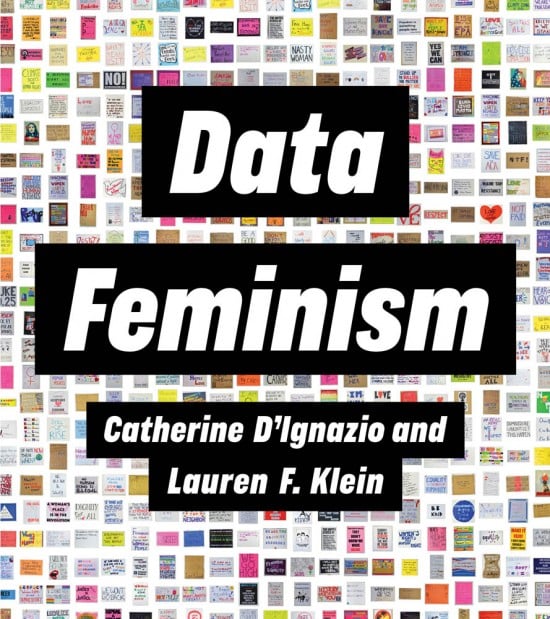
Data Feminism (2020)
By Catherine D’Ignazio and Lauren Klein
May 13, 2021
Highlights of Discussions:
- What’s a good balance between technical details and social scientific inquires?
- What kind of context/details would allow the readers to probe inside the black box?
- How to navigate the problem of missing/absent data when interpeting data analysis?

Digital Countercultures and the Struggle for Community (2017)
By Jessa Lingel
April 16, 2021
Highlights of Discussions:
- Do the frameworks of flexibility, authenticity, legibility work for examining both counterculture and technology?
- How are communities defined? How did Lingel define community in her research?
- How do the three case studies of countercultures in the book compare to bigger, more mainstream communities like Black Twitter?
- How big of a role does one’s affiliation with a community play in their contextual identity?

Obfuscation: A User’s Guide for Privacy and Protest (2015)
By Finn Brunton and Helen Nissenbaum
March 18, 2021
Highlights of Discussions:
- How can obfuscation be implemented as an everyday form of resistance or a “weapon of the weak,” as articulated by political scientist James C. Scott?
- What are the limitations of writing a “user guide”? Would people benefit more from shared stories of success? For whom are the authors writing?
- What’s the implication of bringing these strategies of obfuscation to light? Would the visibility harm the “powerless” that have no choice but to obfuscate?

Design Justice: Community-Led Practices to Build the Worlds We Need (2020)
By Sasha Costanza-Chock
February 18, 2021
Highlights of Discussions:
- To what extent can we make values transparent and explicit in the design process?
- The tension between neoliberal logics and the pursuit of design justice?
- What does fairness mean in the design of system? Is fairness achievable when someone will always be left out? Is fairness the end-goal?
- How to incorporate design justice into the pedagogy in a university setting (e.g. at the Digital Due Process Clinic)?

Uncanny Valley: A Memoir (2020)
By Anna Wiener
January 21, 2021
Highlights of Discussions:
- How does Wiener’s identity as a white female working in a non-technical role influence her experience in Silicon Valley?
- How much does Wiener’s liberal arts education as a sociology major at Wesleyan University inform her critique of Big Tech?
- How to think of Wiener’s position as someone working in Silicon Valley while attempting to immerse in the counterculture in the Bay Area?
- What are some contrasts between the publishing industry and the tech industry? Stagnant and predictable v.s. aspirational and entrepreneurial?

Distributed Blackness: African American Cybercultures (2020)
By André Brock Jr.
December 4, 2020
Highlights of Discussions:
- Brock’s emphasis on Critical Technocultural Discourse Analysis. What did we think of his methodology?
- Libidinal economy? Studying feelings; jouissance, pathos?
- How can scholars study systems at the margins?
- The centrality of Du Bois’s concept of ‘double consciousness’?

We Are Data: Algorithms and The Making of Our Digital Selves (2017)
By John Cheney-Lippold
November 15, 2020
Highlights of Discussions:
- How does algorithmic ‘identity’ relate to identity if, as Cheney-Lippold argues, “we are not quite aware of the categories we are classified into”?
- To what extent does miscategorization matter in ordinary people’s daily life?
- Cybernetics (ch. 2), feedback loop, and concept of ‘measurable types’. How do we feel about the reference of these terms?
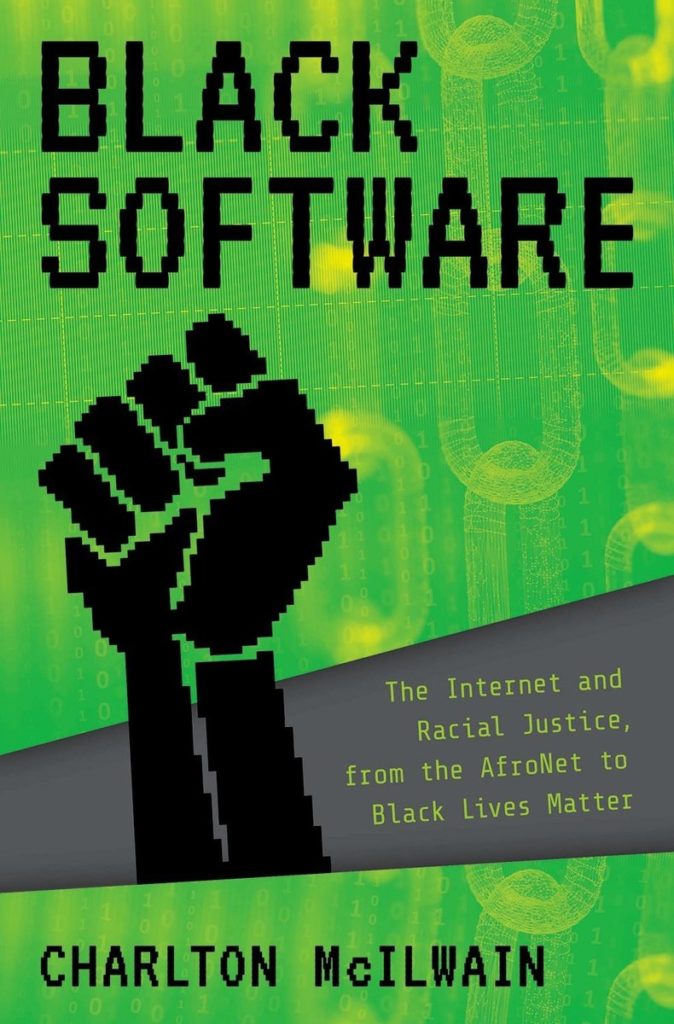
Black Software: The Internet and Racial Justice, from the Afronet to Black Lives Matter (2020)
By Charlton McIlwain
October 15, 2020
Highlights of Discussions:
- What to think of the notion that “African Americans as not just technologists, but automatically as activists too”?
- What is the role of drugs in the rationalization of racial codes/profiling?
- Mcllwain’s choice of building on other Black scholars’ work?

Addiction by Design: Machine Gambling in Las Vegas (2012)
By Natasha Dow Schüll
September 25, 2020
Highlights of Discussions:
- What are the connections between “the zone” of addiction and social media platforms such as TikTok?
- What is the role of architecture and space in creating “the zone”?
- In light of greater public awareness of the roles algorithms play in our daily life, will ethnographic study like this still be possible in the future?
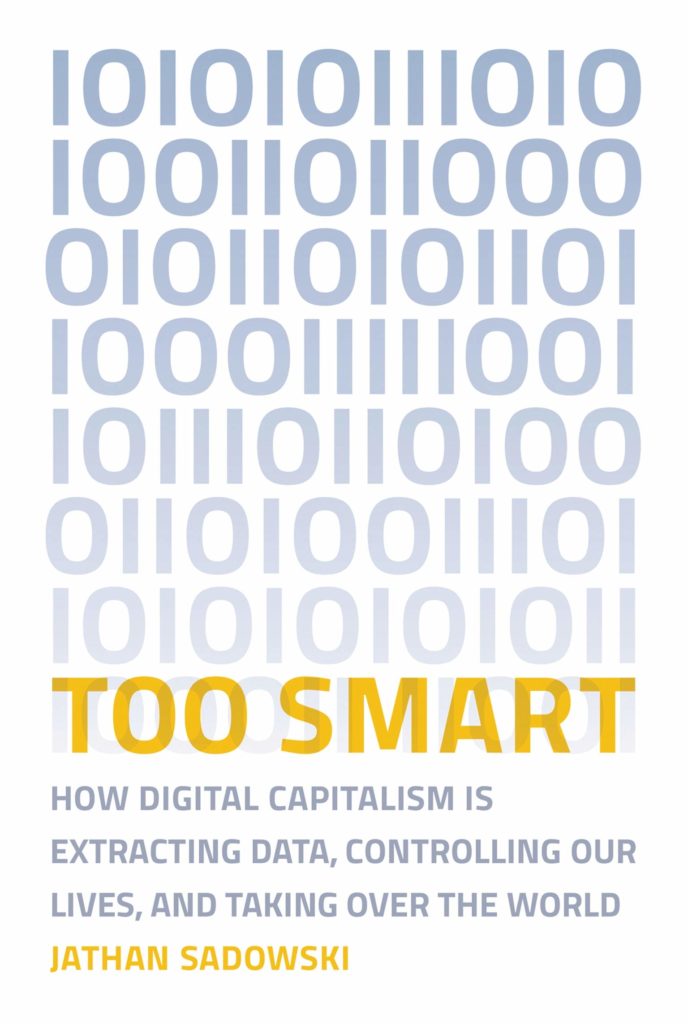
Too smart: How digital capitalism is extracting data, controlling our lives, and taking over the world (2020)
By Jathan Sadowski
September 10, 2020
Highlights of Discussions:
- Who owns whose data when people are “sliced into data streams”? Is data collection a form of theft?
- Is democratizing innovation the way to go forward? Do we feel more ‘empowered’ knowing what we’ve read?
- Is datafication a form of violence? Do we feel violated, or is it normalized?
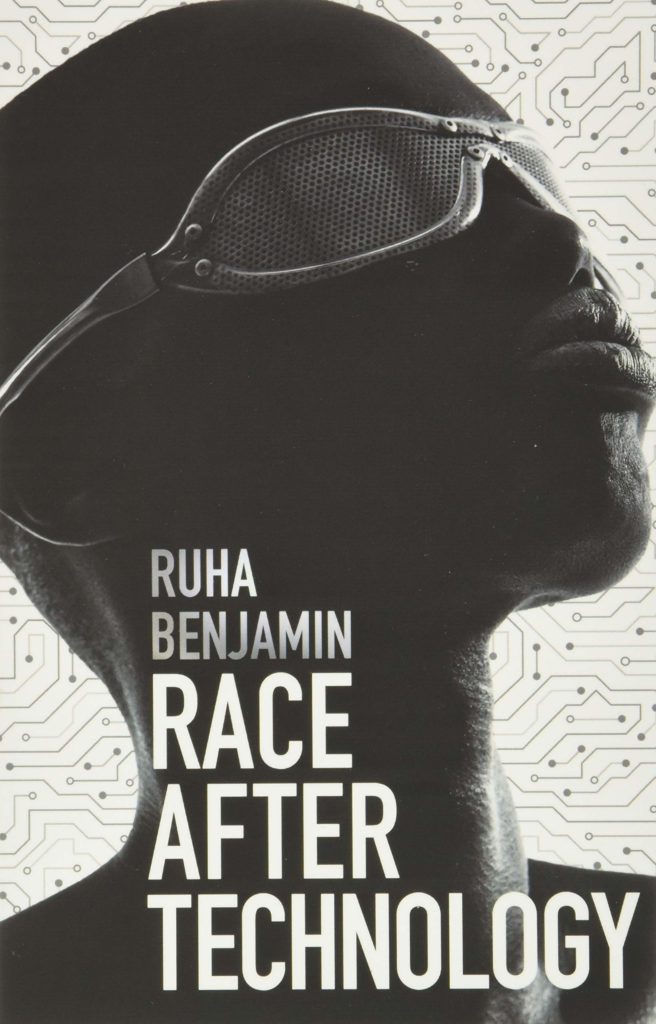
Race After Technology (2019)
By Ruha Benjamin
September 3, 2020
Highlights of Discussions:
- Race is/as a technology?
- How does the clinic fit into the “abolitionist toolkit”?
- How to think of Benjamin’s conceptualization of the “New Jim Code”?
Summer 2020 ⛱️
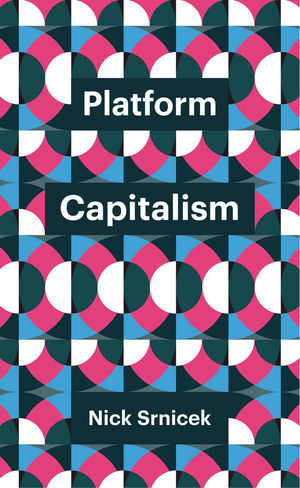
Platform Capitalism (2017)
By Nick Srnicek
August 20, 2020
Highlights of Discussions:
- What are the “means of production” in platform capitalism?
- What to do? How to resist, subvert, or change?
- The connections between Srnicek’s concept of platform capitalism and Zuboff’s framework of surveillance capitalism?

Ghost Work: How to Stop Silicon Valley from Building a New Global Underclass (2019)
By Mary L. Gray & Siddharth Suri
August 6, 2020
Highlights of Discussions:
- What are the ethical implications of utilizing Amazon MTurk for research purpose?
- Thoughts on the paradox of the last mile of automation? Will human v.s. the machine always be a dichotomy?
- How do platforms facilitate the uneven balance of “transaction costs” between recruiters and workers?
- How is the distinction between human and machine mobilized and challenged throughout the book?
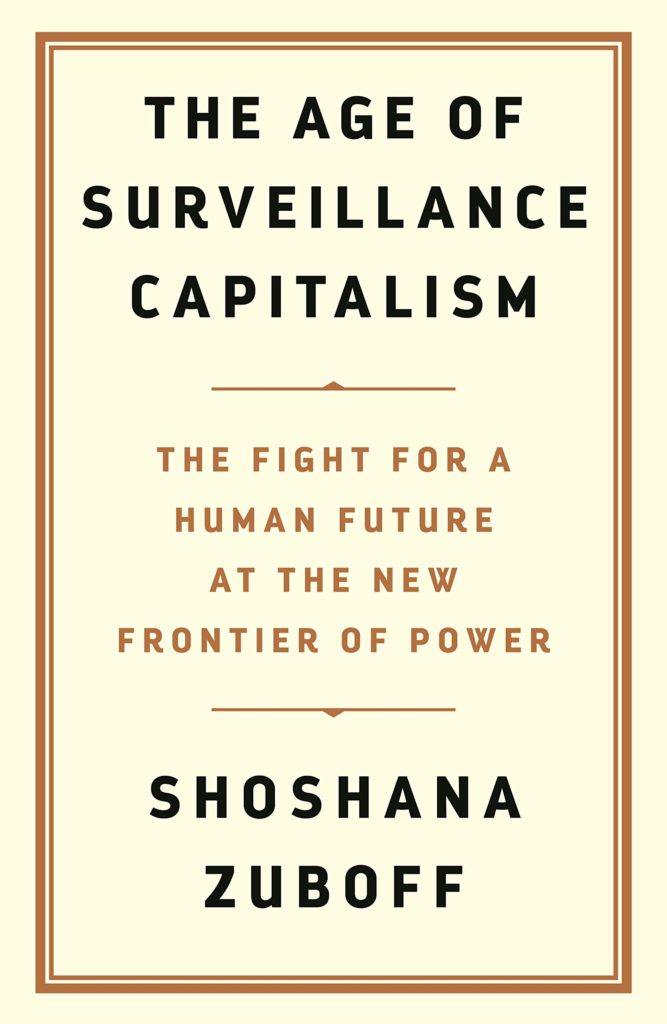
The Age of Surveillance Capitalism: The Fight for a Human Future at the New Frontier of Power (2019)
By Shoshana Zuboff
July 17-31, 2020
Highlights of Discussions:
- What role do people/data subjects play in surveillance capitalism?
- What is the relationship between the emerging logic of neoliberal capitalism and the rise of surveillance capitalism?
- How to conceive of the performative nature of “behavioral surplus”?
- What does personalization look like from a generational standpoint? Are there different “cultures of personalization” in its adoption?
- What would a critique of power under conditions of surveillance capitalism look like?
